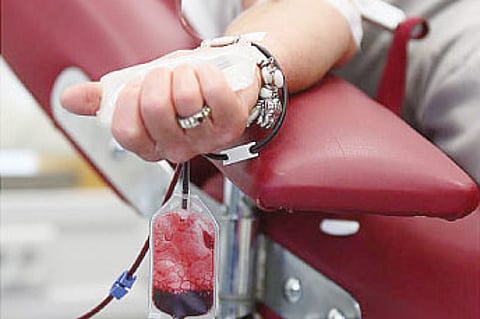

Summer is not the favourite season of many and people usually prefer to stay indoors for most of the time. Every year, this reason impacts the availability of blood at the blood banks, as donation drives fail to garner donors in large numbers.
When the Thalassemia and Sickle Cell Society (TSCS) Hyderabad tried organising a donation drive recently, hardly 20 people turned up.
“Usually, at least 100 people come whenever a blood donation camp is organised, but as it is summer and vacation time, the turnout was very low,” says Dr Suman Jain, secretary, TSCS. The society provides subsidised treatment to over 1,900 Thalassemia patients whose survival depends upon repeated blood transfusions.
The crisis though isn’t just limited to them; the situation is similar across most blood banks in the city.
“It happens every year during summer. A substantial amount of blood comes from donations by youngsters and college-goers who participate in drives held at their colleges. As educational institutes have been closed for summer vacation, the supply has reduced,” reiterates Sunil who handles the donations at Red Cross Blood Bank.
Blood donation drives are also organised at corporate offices too. But as they happen only once every three months or so, the number of units received from this source is not enough to keep the supply up.
Considering that this is a seasonal occurrence, one would think that blood banks would have had a back-up plan. Agreeing, officials at these banks tell us that the stock was usually replenished with the help of local leaders who organised frequent blood donation drives. But with elections going on, leaders and their supporters have been too busy campaigning to pitch in this year.
An average of two to three drives a week were always conducted, but for the next 10 days not even a single camp has been scheduled.
“The number of units of blood stocked at the bank has fallen by nearly 30 - 40 per cent,” informs Sunil.
TSCS too is facing an acute shortage that has left them with no option but to send back at least 10 children affected by the disease every day.
“We are facing a shortage and it is difficult for children to lead a normal life if they don’t get blood transfusions in time. A few of them have haemoglobin levels as low as seven now,” says Dr Suman.
“These children need blood transfusions every 15 to 21 days throughout their life. We require 30 to 35 units of blood every day, but we are falling short by 10 units at least. Also, the availability of the rare blood groups has been nearly exhausted,” adds the worried doctor.
Due to regulations related to licensing, TSCS can’t accept blood from other blood banks. So, all they can do now is send their patients to another blood bank where their blood type is available.
TSCS has offered to send a mobile team if anybody is interested in organising camps at offices or residential communities to collect blood.